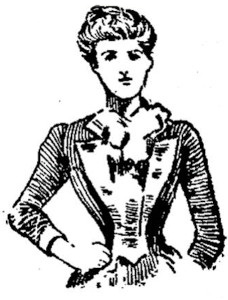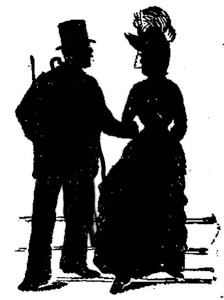This article has been transcribed from a copy of the Cardiff Times in the online collection of scanned Welsh newspapers 1804-1919 in the National Library of Wales, with grateful recognition of the free access accorded to all readers. Paragraph breaks have been introduced for easier reading. —— David Skilton

The common or garden newsboy: one of the worst persons on earth to shake off.
ONLY know one method, sir, of shaking some men off, and that is either to lend them a trifling sum, or try and borrow one. Not even the fact that one has fallen in the social scale and come to grief financially will suffice to keep some men away from one — they will give an occasional call all the same, if it be only to spy into the nakedness of the land [Genesis 42:9]. To soothe the laceration of your feelings very naturally created by your misfortunes, they will pleasantly give you to understand that had you but followed their advice, all would have been well with you. They won't omit to mention to you that you always were slow to receive honest advice. Yes, sir, there are certain people who might almost, be dubbed human octopuses (I suppose octopuses is the plural of octopus, but I am by no means sure — and perhaps it doesn't matter), people who stick to you like a porous plaster or stammering.
In days of prosperity these people have the friend-like faculty or instinct of always turning up at the most inconvenient time. You are giving a swell dinner-party, we will say, whereat the guests are people in whose eyes you would appear to the fullest advantage; possibly you are to some extent drawing on your imagination in your description of your own family connections (one sometimes has a way of that sort), and are endeavouring to convey an impression as to your present position and prospects not quite justified by the actual circumstances — and the man who will not be shaken off is bound to call at this juncture, and in some ingeni[o]us way only known to his pachydermatous (good long word isn't it?) class to impel you to ask him to remain a member of the party. Generally he intimates at once that he has come to spend ‘a quiet evening’ with you, but that of course if you have a dinner party he is afraid that he may intrude. Ten to one that man will stop to dinner, and, as he happens to have known you since you were born, [and the have known your before your were born] and to have known your father before you, his presence very considerably clips your social wings as it were. He will, without being in the slightest degree openly rude, put you right as to dates and other matters of fact, and you begin to feel very small indeed. More often than not he is that biggest of all bugbears – a poor relation, who likes to boast that be is a 'working-man,' before company. It may seem distressingly snobbish to say so, sir, but when I see at a dinner-table that inevitable poor relation, who will not be shaken off, I am tempted to turn my back on my own flesh and blood and to renounce all ties of kinship whatever. There is about this species of man who will not be shaken off something so sublimely self gratulatory. He seems to be saying to himself ‘They don't want me; I know it; they think they are better than I am; I'll play the part of the skeleton at this feast; whenever I open my mouth, they’ll wonder what's coming; I'm having larks, I am.’

Not the sort the average bachelor cares to shake off.
I cannot, sir, describe the feeling of detestation with which I regard the man (oh, how hard it is to stave him off) who thinks that he is pleasing me when he talks about nothing but newspapers and magazines all the time he is with me, yet that man often comes across my path. He invites my opinion as to what I consider 'the best London paper' or submits to me some other vague problem equally hard of solution. When the very sight of a newspaper is hateful to me in my hours of leisure, he seeks to peer beneath the cloak of anonymity inseparable from the newspaper journalist and fires whole broadsides into me as to who wrote this or who writes that, and the worst of it all the time he wears an air of complacency that is infinitely irritating and that is palpably born of the fact that he all the time thinks he is giving me satisfaction by talking of the very things that I would most willingly avoid.

We all know the man who will not be got rid of until he has had a drink. Sometimes he is a seedy and rather broken-down man whom one has been acquainted with more or less intimately in his more prosperous days[;] sometimes he is simply a human leech that one has met in general company, and who will insist on forcing his company upon one. In the first case one generally meets the individual in a forenoon in one of the principal streets; his ever-watchful eye is roving about in search of old friends. When he sees you, he rushes up and shakes hands with great effusion, for he is a painfully polite man. You have scarcely the opportunity of explaining that you are in a hurry, for his volubility is great; the torrent of his speech admits of no interruption; you are fairly 'copped' to use an expressive vulgarism. He gives you to understand that he has been wanting to have 10 minutes' conversation with you for a long time, as he has got on his mind subjects for articles which ought to make the fortune of any paper, and with this expression of a desire for a few minutes' quiet conversation he links a confidential intimation that he was just 'a little bit off' the previous night and that this morning his tongue is like a piece of blotting-paper, and that so parlous is his general condition that he more resembles 'a bit of chewed string' than a human being. What can you do under the circumstances but suggest some alcoholic remedy for these distressing symptoms? He is a man who is always dreadfully candid about his impecuniosity, and one who bears the dubious reputation of always paying 'when he has it' — a fact which does not help one much, seeing that he never does have it, and is never likely to have.